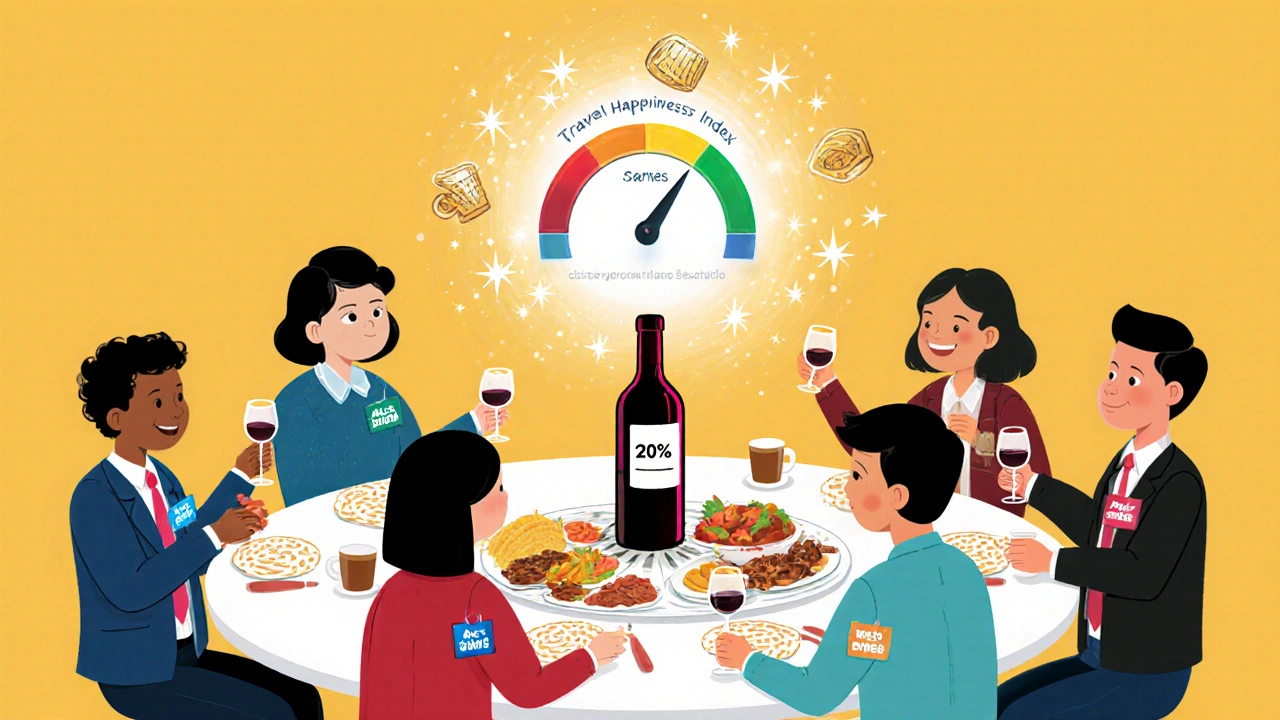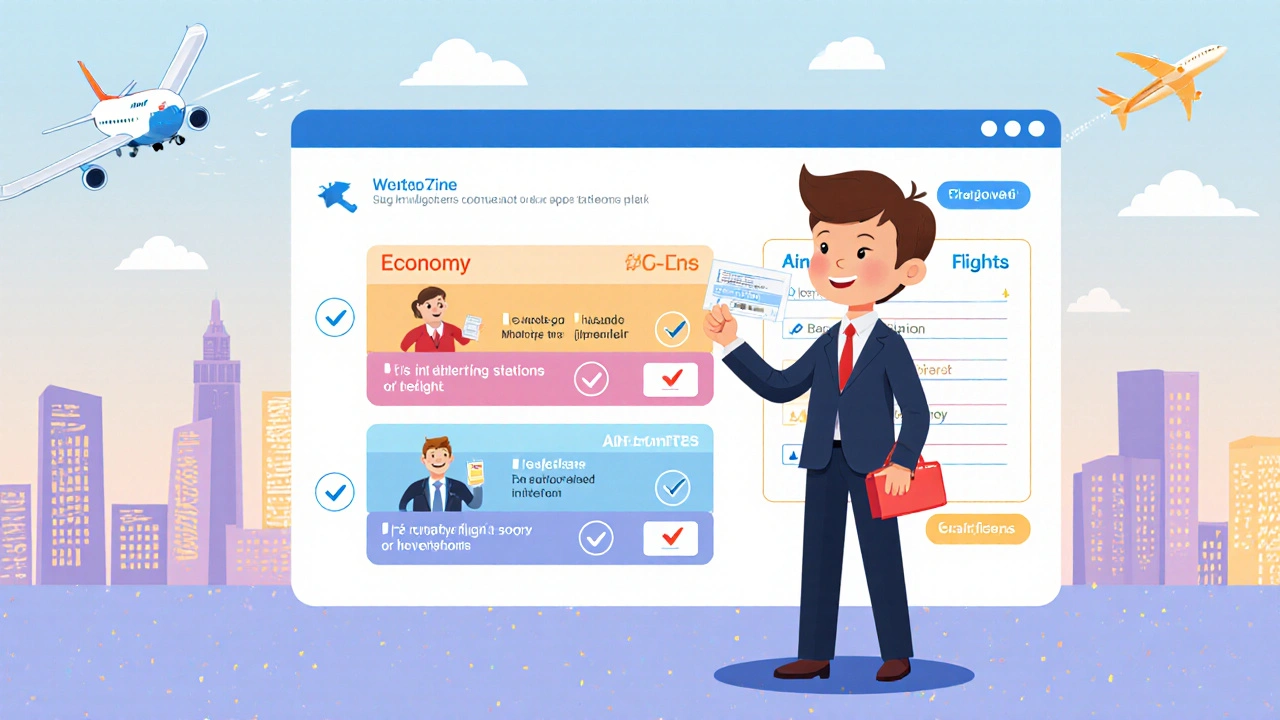Why Your Travel Policy Is Either Saving Money or Killing Productivity
Most companies think travel policies are about cutting costs. They’re not. They’re about control. Without clear rules, employees book last-minute flights, upgrade to business class on a 3-hour trip, or stay at luxury hotels because ‘it was the only option.’ That’s not convenience-it’s leakage. Companies without formal travel policies lose 22% to 35% of their travel budget to unmanaged spending. That’s not a typo. That’s real money vanishing into expense reports with no receipts, no approvals, and no accountability.
But here’s the catch: the most restrictive policies don’t save money long-term. They just make employees angry. And angry employees find workarounds. They use personal credit cards. They claim meals as client entertainment. They book flights on weekends just to avoid the policy. The result? Higher costs, more fraud, and zero trust.
Airfare Rules That Actually Work
Let’s start with flights. The average corporate airfare policy says: book 14 days ahead for domestic, 21 for international. That’s not arbitrary. Data shows that booking 14+ days out saves companies an average of 18% per ticket. But here’s what most policies get wrong-they treat every employee the same.
Sales teams need flexibility. A rep flying to meet a client in Chicago on a Tuesday? Forcing them to take a 5:30 a.m. flight with two connections to save $47 isn’t smart. It’s stupid. That employee loses half a day of productivity. They’re exhausted. They can’t focus in the meeting. And they resent the policy.
Top-performing companies handle this differently. They set tiered rules:
- Under 4 hours: economy class only
- 4 to 8 hours: premium economy allowed
- Over 8 hours: business class permitted
And here’s the real trick: they allow exceptions-but only if you ask. No more sneaky bookings. If you need a direct flight because your client’s schedule is tight, submit a request. Get it approved in under two hours with tools like TravelPerk or Navan. That’s how Salesforce does it. And guess what? Their policy violation rate dropped 47%.
Same-day bookings? Still banned… unless it’s an emergency. And even then, it needs VP approval. That keeps the floodgates closed without crushing real business needs.
Hotel Limits: It’s Not Just About Price
Hotel caps are the most hated part of any travel policy. $199 a night in New York? That’s fine if you’re booking a Motel 6. But in 2025, that’s not realistic. The average rate for a safe, clean, business-friendly hotel in Manhattan is $285. A policy that forces people to stay in sketchy neighborhoods because ‘the cap is the cap’ isn’t saving money-it’s risking safety.
The smartest companies don’t use fixed numbers. They use tiers:
- Tier 1 (New York, SF, London, Tokyo): $250-$300
- Tier 2 (Chicago, Atlanta, Berlin): $175-$200
- Tier 3 (Cincinnati, Tulsa, Prague): $120-$140
And they map those tiers to safety data. American Express updated its policy in March 2024 to auto-adjust hotel budgets based on real-time crime and weather alerts. If your flight lands in a city with a storm warning and the recommended hotel is closed? The system bumps your budget automatically. No forms. No delays. Just safety.
Room types? Standard room only-no suites, no balconies, no ‘business lounges’ unless you’re a director or above. That’s not greed. That’s fairness. And it works. Companies with clear room rules see 89% fewer hotel complaints.
Perks: Meals, Alcohol, and the Art of Not Being a Jerk
Per diems are where policies go off the rails. $65 a day for meals in LA? Sounds fair. But what if you’re meeting a client for dinner? Can you really order a bottle of wine and stay under $65? Probably not. And if you can’t, you skip the drink. Suddenly, you look cheap. Or worse-you’re not building trust.
Most companies cap alcohol at 25% of the meal allowance. That’s fine. But here’s the problem: they don’t adjust for context. A $55 per diem in Atlanta doesn’t cover a $120 dinner with a key client-even if you skip the wine.
HubSpot fixed this. They added a ‘travel happiness index.’ If you’re on a trip longer than five days, your meal allowance jumps 20%. Why? Because fatigue kills performance. And they let employees spend the extra on whatever they need-coffee, snacks, a decent dinner. Result? 41% higher policy compliance.
And alcohol? Don’t ban it. Just cap it. Let people spend up to 25% on drinks. If they need to go over? They can request it. And if they’re meeting a client? They get a 50% higher allowance for that one meal. No guilt. No hiding receipts. Just clear rules.

Why One-Size-Fits-All Policies Fail
Finance companies lock everything down. CFO approval for every exception. 22% lower travel costs? Sure. But 34% longer booking times. And sales teams? They’re stuck waiting days to book a flight to close a deal. That’s not control. That’s sabotage.
Tech companies? They’re the opposite. 63% allow same-day bookings for engineers. 47% let you stay at 5-star hotels overseas. Their travel costs are 9% higher. But they close deals 27% faster. Why? Because their people aren’t wasting time fighting the system.
The winning model? Segment by role.
- Sales: Higher airfare allowance ($750 domestic roundtrip), stricter hotel limits ($149/night)
- Executives: Higher hotel limits ($179/night), business class on international flights
- Engineers: Flexible booking windows, no cap on local transportation
- Support staff: Standard rules, no exceptions
Companies that do this see 28% fewer policy violations. Why? Because people feel trusted. And when you trust people, they act responsibly.
Technology Is the Real Enforcer
Spreadsheets and PDFs don’t work anymore. You need software that blocks bad bookings before they happen.
92% of companies with strong policies use platforms like TravelPerk, Navan, or SAP Concur. These tools embed your rules into the booking engine. If someone tries to book a $300 hotel in Tier 3? The system says, ‘That’s over limit. Try this one.’ If they try to book a business class flight for a 3-hour trip? It blocks it. And if they need an exception? They click ‘Request Override,’ fill out a quick form, and get an answer in under two hours.
That’s not automation. That’s intelligence. And it’s why companies using these tools cut manual approval time from 4.2 days to under 5 hours.
The Future: Policies That Care About Results, Not Just Costs
The old way was: ‘How much did we spend?’ The new way is: ‘What did we get?’
Salesforce is testing a pilot where top salespeople earn 10% higher travel budgets. Why? Because those reps close deals 18% faster. The ROI? Clear.
Other companies are linking travel to carbon goals. If you fly economy under 2,000 miles? You get a 15% higher allowance. Fly business class? You pay for the carbon offset. That’s not punishment. That’s responsibility.
By 2027, Forrester predicts 75% of leading companies will measure travel success by revenue per travel dollar-not by how cheap the flight was. That’s the future. And it’s already here.

How to Fix Your Policy (Without Making Everyone Hate You)
Here’s your step-by-step plan:
- Look at your last 18 months of travel data. Where’s the money leaking? (Hint: 23% of airfare is booked within 72 hours of departure.)
- Segment your travelers. Sales, engineers, execs, support-each needs different rules.
- Set tiered hotel limits based on city safety and real-time data-not fixed numbers.
- Allow alcohol. Cap it at 25%. Let people request exceptions for client dinners.
- Use a travel platform that blocks bad bookings and auto-approves exceptions.
- Ask your travelers for feedback. Quarterly. Seriously. They know what works.
Don’t try to control everything. Control the big stuff. Trust people with the rest.
Frequently Asked Questions
Can I really get away with booking a business class flight for a 5-hour trip?
Only if your policy allows it. Most companies cap business class at 8+ hour flights. But if you’re flying internationally, or if you’re a senior executive, exceptions are common. The key is having a clear approval process-not sneaking it in. If your company uses a travel platform, it’ll flag the booking and ask for approval. That’s how you stay compliant without being punished.
Why do some companies allow same-day bookings while others don’t?
It comes down to culture and role. Tech companies and sales teams need speed. Waiting 14 days to book a flight to meet a client isn’t practical. Companies that allow same-day bookings for certain roles see faster deal closures and higher satisfaction. But they also have strong approval workflows. It’s not chaos-it’s controlled flexibility.
Is it okay to use my personal credit card for travel if I get reimbursed?
Technically, yes-but it’s risky. If you’re using your card, you’re responsible for the charge until reimbursement. That can take weeks. And if the policy isn’t followed? You might not get paid back. Most companies now issue corporate cards tied to policy rules. If you’re forced to use your own card, it’s a sign your policy isn’t working.
How do I know if my hotel choice is allowed?
Check your company’s approved hotel list. Most travel platforms show only compliant options. If you’re booking outside the system, look up your city’s tier and max rate. If you’re unsure, ask your travel manager. Don’t guess. A $200 hotel in a Tier 3 city might look fine-but it’s over the limit. And you’ll get flagged.
What’s the best way to handle meal allowances when traveling internationally?
Don’t use fixed USD amounts. Use per diem rates from the U.S. State Department or GSA, adjusted for local currency. Many platforms auto-convert these daily. If your company doesn’t, ask for a list of approved international per diem rates. And remember: alcohol caps still apply. Even if it’s normal to drink wine with dinner in Paris, your company’s rule is 25% of your meal allowance.
What to Do Next
If your travel policy feels broken, start here: gather your last 12 months of expense reports. Find the top 5 most common violations. Are people booking last-minute flights? Upgrading hotels? Claiming alcohol as ‘client meals’? Those are your pain points.
Then talk to your travelers. Not HR. Not finance. The people who actually travel. Ask them: ‘What’s one thing about our policy that makes your job harder?’ You’ll hear the same thing over and over: ‘I just want to be trusted.’
Fix the big rules. Automate the rest. And stop treating your employees like criminals. They’re your best asset. Let them do their job.




Okay but let’s be real-most companies still treat travel like a prison sentence. I work at a SaaS startup and our policy lets me book business class on anything over 5 hours. No forms, no begging. I used to book economy and show up to client meetings looking like I’d slept in a bus station. Now? I’m fresh, focused, and actually closing deals. They don’t save $47 on my ticket-they make $12K in revenue because I didn’t look like a homeless intern. Trust > control.
Let me just say this with surgical precision: any policy that doesn’t integrate real-time geo-safety data into hotel allocations is not just outdated-it’s negligent. I’ve seen colleagues stranded in Manchester after a terrorist alert because their system defaulted to a ‘budget’ hotel 3 miles from the incident zone. The fact that AmEx now auto-adjusts based on crime and weather? That’s not innovation-that’s basic duty of care. And if your CFO still thinks $199 in Manhattan is ‘reasonable,’ he’s either delusional or actively endangering his staff. Fix this. Now.
It is fascinating, truly, how we have come to equate financial control with human distrust. The very essence of corporate travel policy has been warped into a mechanism of surveillance rather than support. When we impose rigid caps on hotel rooms, when we forbid wine at dinner because ‘it’s not allowed,’ when we demand 14-day advance bookings for sales reps who are chasing fleeting opportunities-we are not saving money, we are eroding dignity. What is the cost of a tired, resentful employee who no longer believes their company sees them as a person, but as a line item? I have watched brilliant minds leave startups not because of pay, but because they were tired of begging for permission to be professional. Perhaps the real ROI of a good travel policy is not in reduced expenses, but in restored trust. And trust, my friends, cannot be automated. It must be given.